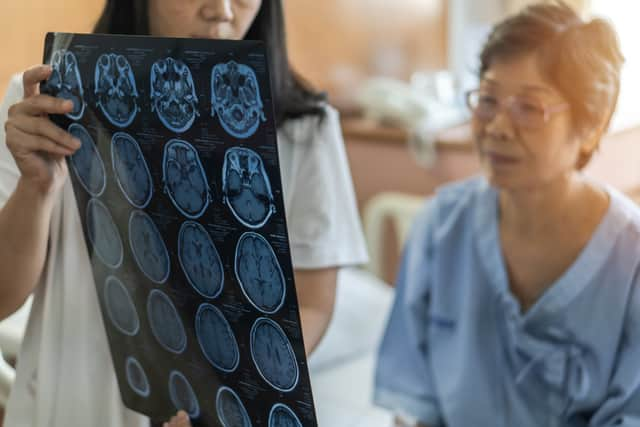Stroke symptoms: signs to look out for, what is a mini stroke, causes, and treatment explained
and live on Freeview channel 276
Strokes occur when the blood supply to part of the brain is cut off. But why do they happen, what are the symptoms and how are they treated? Here’s what you need to know.


What are strokes?
Strokes occur when the blood supply to part of the brain is cut off. They are a serious life-threatening medical condition and urgent treatment is essential.
Advertisement
Hide AdAdvertisement
Hide AdThe sooner a person receives treatment for a stroke, the less damage is likely to happen, the NHS said. If you suspect that you or someone else is having a stroke, you need to phone 999 immediately and ask for an ambulance.
What are the symptoms of a stroke?
The main symptoms of stroke can be remembered with the word FAST:
Face – the face may have dropped on 1 side, the person may not be able to smile, or their mouth or eye may have dropped.
Arms – the person with suspected stroke may not be able to lift both arms and keep them there because of weakness or numbness in 1 arm.
Advertisement
Hide AdAdvertisement
Hide AdSpeech – their speech may be slurred or garbled, or the person may not be able to talk at all despite appearing to be awake; they may also have problems understanding what you’re saying to them.
Time – it’s time to dial 999 immediately if you see any of these signs or symptoms.
What causes a stroke?
The brain needs the oxygen and nutrients provided by blood to function properly, but if the supply of blood is restricted or stopped, brain cells begin to die.
This can lead to brain injury, disability and possibly death, the NHS said.
There are two main causes of strokes:
- ischaemic – where the blood supply is stopped because of a blood clot, accounting for 85% of all cases
- haemorrhagic – where a weakened blood vessel supplying the brain bursts
Advertisement
Hide AdAdvertisement
Hide AdThere’s also a related condition called a transient ischaemic attack (TIA), where the blood supply to the brain is temporarily interrupted. This causes what’s known as a mini-stroke and can last a few minutes or persist up to 24 hours.
TIAs should be treated urgently, as they’re often a warning sign you’re at risk of having a full stroke in the near future.
You should seek medical advice as soon as possible, even if your symptoms get better.
Certain conditions also increase the risk of having a stroke, including:
- high blood pressure (hypertension)
- high cholesterol
- irregular heart beats (atrial fibrillation)
- diabetes
How are strokes treated?
Advertisement
Hide AdAdvertisement
Hide AdTreatment depends on the type of stroke you have, including which part of the brain was affected and what caused it.
They are usually treated with medication, including medicines to prevent and dissolve blood clots, reduce blood pressure and reduce cholesterol levels.
The NHS said that in some cases, procedures may be required to remove blood clots.
Surgery may also be required to treat brain swelling and reduce the risk of further bleeding if this was the cause of your stroke.
Comment Guidelines
National World encourages reader discussion on our stories. User feedback, insights and back-and-forth exchanges add a rich layer of context to reporting. Please review our Community Guidelines before commenting.
